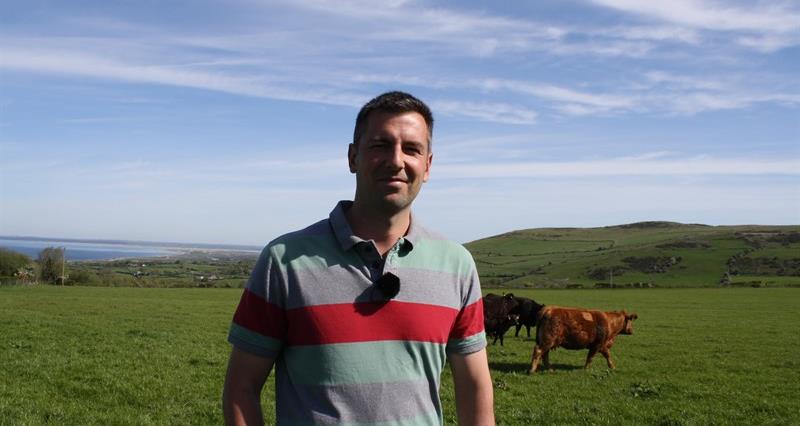Click on these links to skip to a particular section:
 At the heart of Harri’s family run farm in Gwynedd is an ethos of efficiency which, in turn, leads to sustainability.
At the heart of Harri’s family run farm in Gwynedd is an ethos of efficiency which, in turn, leads to sustainability.
They have 32,000 free-range laying hens, 200 suckler cows and 800 breeding New Zealand Suffolk-cross Lleyn and Lleyn sheep. They also grow 100 acres of forage for the animals – including 65 acres of barley, 15 acres of oats and 20 acres of fodder beets. Being as self-contained as possible can really help them to drive efficiency.
Harri explains: “Making everything as efficient as we can means making every cow, every ewe and every crop count, and it all starts with the soil. It’s vital to get the soil working for you with correct indexes and pH levels, by applying plenty of farmyard manure to promote organic matter and only applying fertiliser when we see benefit to it. Now we have poultry on the farm, we’ve got access to high quality manure in the form of poultry muck. Poultry muck reduces our bought-in artificial fertiliser bill, so this again, reduces our carbon footprint.”
“There’s plenty of new young grass on the lowlands and so the livestock thrive. We get excellent growth in the livestock in the spring to autumn period on grass, which is the cheapest food we can grow, and this means we don’t need as much feed over the winter period, which we have had to harvest and store and so is more expensive and has a higher carbon footprint.”
“We also use cover crops and don’t leave soil bare over winter. We grow spring barley and oats, so we harvest that in late August and September, then we go in again with rape and stubble turnips in September – these grow over winter, then the sheep graze them in February and March time.
“We have a lot of mouths to feed from February to April because we lamb in January, so the nutritional requirements of those ewes that have lambs are higher,” says Harri. “So the rape and the fodder beets are our buffer feeds to carry us through winter, until the grass kicks in and starts growing again.”
Health and welfare
Another mainstay of the farm business is Stabliser cattle where good genetics can help to lower the farm’s carbon footprint.
“The health and nutrition has to be spot-on so that everything can thrive.
“We, as farmers, can take steps to improve management that will reduce carbon footprint dramatically. We are involved with the Stabiliser Cattle Company (SCC) and recent work by them shows that farmers can reduce their carbon footprint by 40% with better management of their beef herd, along with Stabiliser cattle genetics.

“All our cattle are performance recorded. We measure and manage so that we are able to select the best ways to move the herd forward, be more efficient and reduce our carbon footprint.”
Renewable energy
As well as utilising efficient methods to increase productivity and lower their carbon footprint, the family also use more visible eco-friendly elements on the farm, including a 50KW wind turbine and solar panels.

“We have had the turbine for about eight years and it supplies us with electricity for the farm and the poultry shed. We have solar panels as well, which heat the holiday cottages, while any excess from the panel and the turbine go back into the grid.
